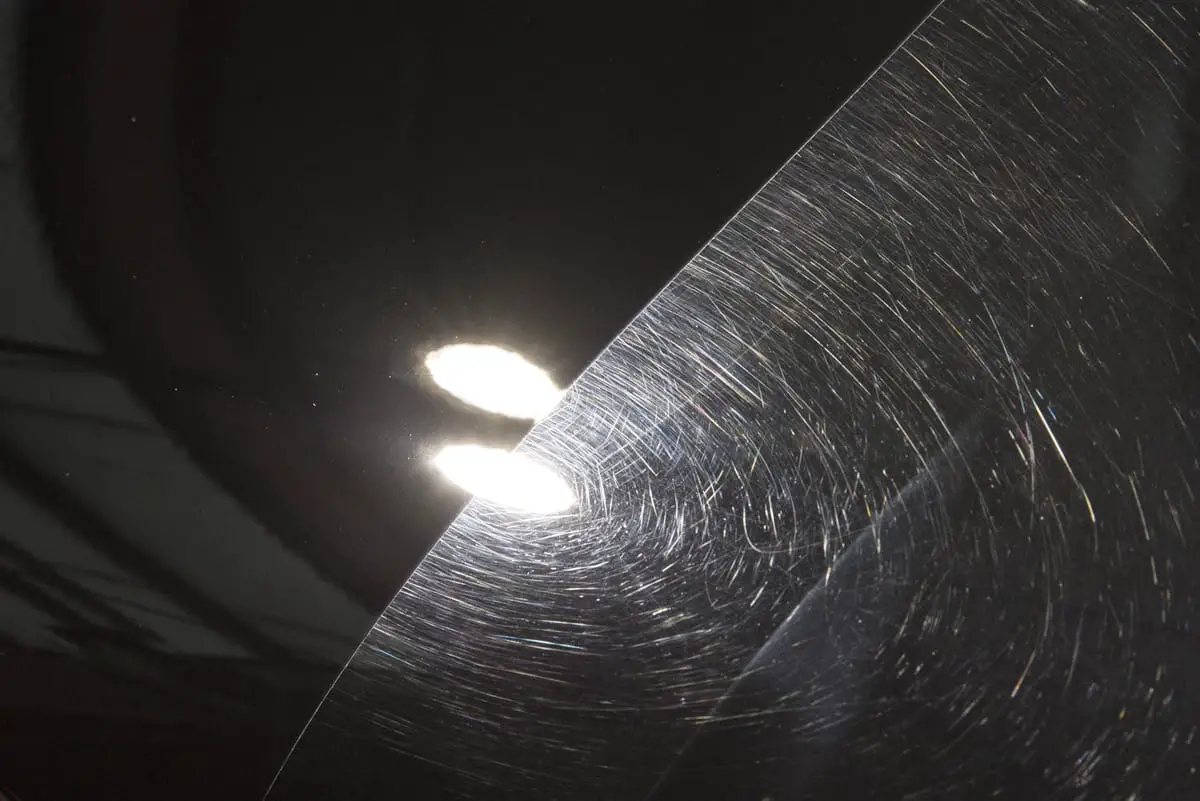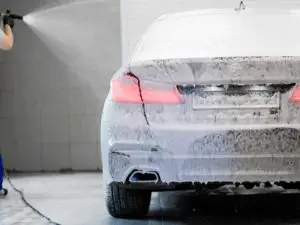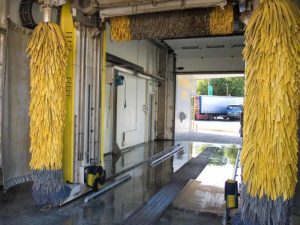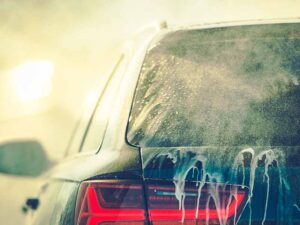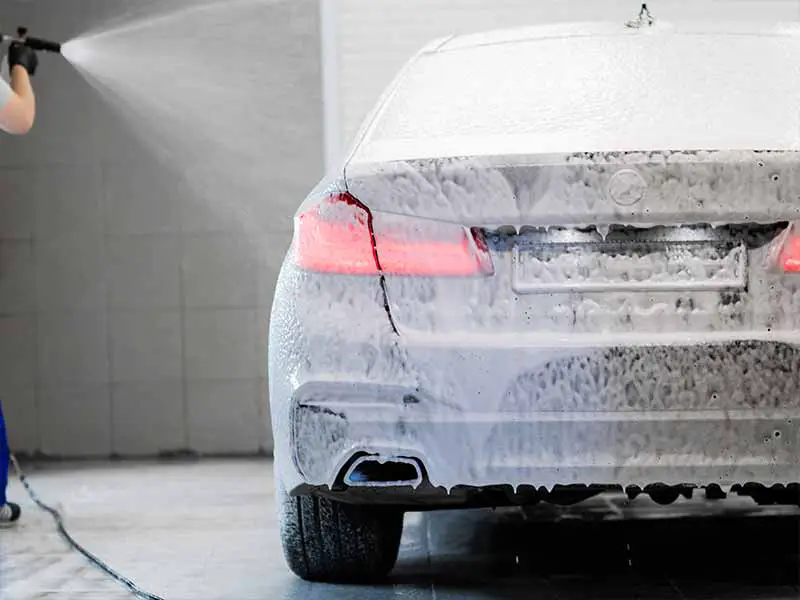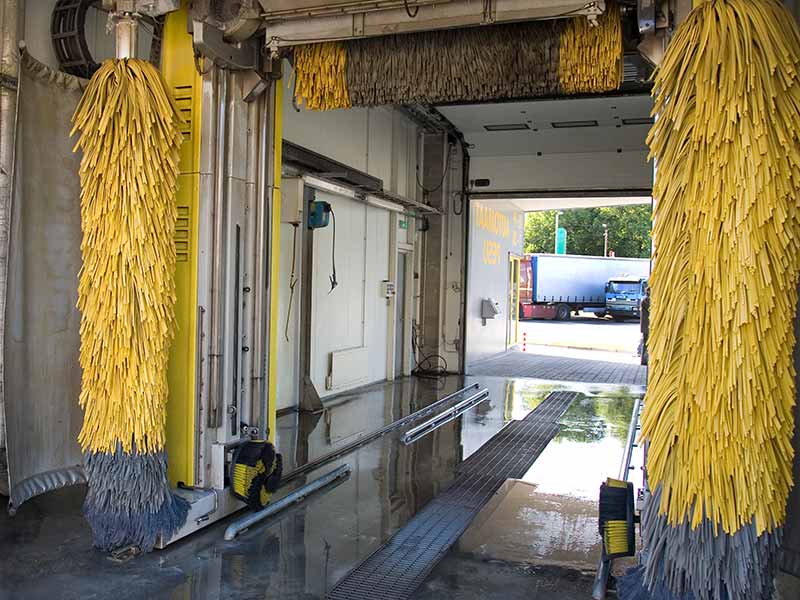Table of Contents
- Can You Wash Your Car Too Much?
- What Not To Do When Washing A Car
- Automatic Car Wash Vs Hand Wash
- How To Properly Wash A Car
- Benefits Of Washing Your Car Regularly
- How Often Should You Wash Your Car?
- Is It Bad To Wash Your Car Every Day Or Every Week?
- When Should You Not Wash Your Car?
- Helpful Links
- Conclusion
I’ll be honest, despite being a writer for a car detailing blog, I don’t wash my car as often as I should. Friends of mine wash their cars much more frequently. I love a clean car, but I don’t always enjoy the process.
Using the proper equipment and techniques is critical to ensuring that you don’t do damage to your paintwork when performing car washes. This is especially true if you feel like you may be doing them too frequently.
Let’s dive into the details of how to properly wash your car safely.
Can You Wash Your Car Too Much?
You can’t wash your car too much, but you can wash your car incorrectly.
Frequent washing, if done improperly, can cause scratches in your clear coat.
Car washing correctly will help protect your paint job and remove environmental contaminants that can begin to etch into and break down the surface if not removed.
What Not To Do When Washing A Car
Avoiding scratches in your clear coat is one of the most important considerations when washing your car. The build up of scratches in the clear coat will cause your finish to look old, dull, and weathered.
Here is a list of the common mistakes made when washing your car:
- Not using a microfiber towel or wash mitt
- Not using 2 buckets and grit guards
- Not using a proper car shampoo
- Not properly drying the finish
- Avoiding direct sunlight
- Using automatic car washes
Automatic Car Wash Vs Hand Wash
The way you wash your car can make a big difference. Automatic car washes are convenient but can be hard on your paint. Hand washing your vehicle is time consuming and more effort. Let’s discuss each.
Automatic Car Wash
Automatic car washes are convenient but they can do more harm than good. The biggest problem is that most of them are not touchless and are likely to cause clear coat scratches.
It’s very difficult for an automatic car wash to both thoroughly clean your car and be gentle. The safest automatic car wash to use is a touchless car wash. These car washes use harsh chemicals to break down the bonds that dirt and debris have with your paint.
The chemicals are reasonably safe but can have an affect on plastic and rubber on your vehicle exterior over time if used frequently.
Hand Wash
Hand washing your car or truck is safer for your finish than an automated machine. You or a detailer will use less force over the entire car and only use pressure where needed.
When hand washing your car, you also choose the type of products that you use to wash your vehicle. A clean microfiber towel, pH neutral car shampoo, pressure washer, foam cannon, grit guards. These are all great products that will minimize scratching and maximize cleaning.

How To Properly Wash A Car
It’s important to use safe methods to protect your car’s finish. There are two car washing methods all car owners should know well:
Touchless Method
The touchless car wash method is a perfect way to wash your car more frequently but virtually eliminate the chance of creating scratches in your clear coat.
The simplified description is to spray your car or truck with a pH neutral car shampoo foam after rinsing it thoroughly with a pressure washer. Allow the foam to work its magic for 5 minutes or so, and then rinse thoroughly with your pressure washer again. Follow this with an car dryer or leaf blower to touchlessly dry the surface before it can air dry and leave water spots.
This method can’t replace a proper two bucket method car wash but it is perfect for someone that would like to do safe maintenance washes in-between manual hand washes.
Be sure and read our detailed article on the Touchless Car Wash Method.
2 Bucket Method
The two bucket method is the most popular method for detailers who wash their cars by hand. It uses 2 buckets (obviously) with one for soaping up your microfiber wash mitt and the other for rinsing before placing back in the soap bucket.
This is to capture dirt and grit in the rinse bucket and prevent it from being dragged across the surface of your paint job where it can cause swirl marks and light scratches.
Grit guards are suggested for each bucket to trap dirt and road grime at the bottom of the buckets and prevent it from being picked back up by your wash mitt accidentally.
I also use all of the touchless method steps in my 2 bucket process to remove as much dirt and debris as possible before physically touching the paint.
Be sure and read our detailed article on the Two Bucket Car Wash Method.

Benefits Of Washing Your Car Regularly
It’s important to keep your car clean and free of environmental contaminants. Most vehicle owners tend to avoid regular car washes and as a result, their car’s paint suffers after a long period of neglect.
Here are some of the benefits you can expect if you wash your car regularly:
- Less damage from environmental contaminants over time
- Regular car washes become easier because there is less stubborn road grime and contaminants
- Helps maintain higher resale value by preventing surface damage due to neglect
- You are more aware of paint defects and other damage when they occur and can fix them immediately
- You’ll always have the cleanest ride on the block 😉
How Often Should You Wash Your Car?
The short answer is you should wash your car as often as it needs to be washed.
To better answer this question, you should remove build up of environmental contaminants like iron fallout, rail dust, bird droppings, tree sap, road salt, and more to prevent them from breaking down and etching into your car’s paint.
Your car wash schedule will depend on where you live, if you keep your car in a garage, and how often you drive. If you deal with frequent rain, snow, extreme heat, dust, salt, etc. you will have to judge for yourself how often to wash your car or truck.
How Often Should I Wash My Black Car?
A black car or truck will look dirty more quickly than a light colored vehicle. This means you’ll likely want to wash it more frequently.
Black cars also show clear coat scratches more easily too. This means it’s even more important to use wash your car properly to avoid swirl marks and light scratches.
Keeping black paint free of dust and dirt will not only make it look better, but will help protect the finish from damage from environmental contaminants that bake in the sun and etch into and break down your paintwork.
Your car wash schedule will still depend upon where you live, if you have covered parking, and how often you drive. But it will likely need to be washed more frequent than a lighter colored vehicle.
How Often Should I Wash My Car In The Winter?
It’s important to keep road salt off of your undercarriage during the winter months if you live in an area that experiences snow and ice regularly.
To keep your vehicle clean of salt it’s we recommend washing your car or truck every two weeks. Washing every two weeks is a good frequency to wash your vehicle year round, but you should pay extra attention to the undercarriage and wheel wells during winter to help prevent premature rusting due to excessive salt accumulation.

Is It Bad To Wash Your Car Every Day Or Every Week?
If you are using the proper equipment, cleaning products, and car wash techniques, it shouldn’t matter how often you wash your car or truck.
There’s no such thing as over washing if you wash your vehicle safely to minimize opportunities to scratch the finish.
Does Washing Your Car Too Much Ruin The Paint?
The terms “too much” and “ruin” can be a bit vague. You really can’t wash your car too much if you are washing it properly.
You can create an extreme amount of swirl marks and light scratches in the finish if you wash your vehicle at an automatic wash with brushes or other potentially damaging methods.
This won’t “ruin” the paint, but severely spiderwebbed looking paint is less than ideal. The good news is that this doesn’t “ruin” paint. Paintwork with surface scratches can be restored with car polish and a dual action polisher.
Do I Need To Wax My Car After Every Wash?
Wax doesn’t need to be reapplied after every car wash if your vehicle’s paintwork still beads water well.
If your vehicle’s exterior begins to no longer bead well you should consider reapplying wax to the finish.
You may also want to consider a paint sealant, which will last much longer than traditional carnauba wax, or a ceramic coating, which will last much longer than a paint sealant and can even help prevent scratches.
When Should You Not Wash Your Car?
Here are some conditions or circumstances that you should avoid when washing your car:
- Avoid washing your vehicle in direct sunlight to prevent water spots
- Avoid washing your car if you don’t have the proper equipment and cleaning supplies
- Avoid washing your vehicle when the temperature is below freezing
- Avoid washing your car in automatic car washes that are not touchless

Helpful Links
Conclusion
A frequent car wash schedule isn’t a bad thing. You just need to ensure you’re using proper soap and other cleaning products as well as have the right equipment on hand to the do the job without causing harm to the finish.
Avoiding potentially damaging automatic car washes is important to preventing surface damage.
Hand washing with the two bucket method or touchless method are much safer and can be beneficial to your finish if done properly.
Regular car washes not only keep your car or truck looking good, but they remove environmental contaminants that can do damage to your paintwork if left to bake in the sun for weeks or months.
Don’t worry about washing your car or truck too often. That’s a good problem to have. Just make sure you are careful to use the proper techniques to do so safely.
Good luck and happy detailing.
